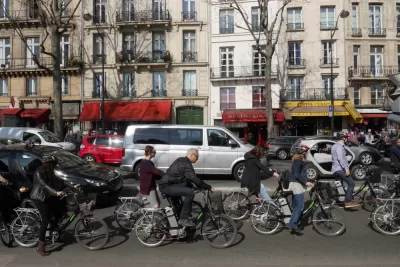Continuing Mayor Anne Hidalgo's efforts to make Paris more accessible to pedestrians and cyclists, the city plans to implement a 'car-light' zone in the city center that prohibits through traffic.

In an article in Fast Company, Adele Peters reports on a plan to make a section of downtown Paris 'car-light' by limiting the traffic that can pass through it.
"The area, which the city is calling a zone apaisée or quiet zone, won’t be car-free—residents will still be able to drive there, and if someone is going to a store or art gallery or another destination in the area, they’ll still be able [to] arrive by car." Vehicles will be checked by police and, eventually, automated cameras. "Delivery drivers, taxis, buses, ridesharing vehicles, disabled people, and people going to work in the area will also be able to drive." But banning the more than 100,000 trips made by cars cutting through the zone, writes Peters, can make a significant dent in the neighborhood's air pollution.
Paris has been phasing out the most polluting diesel vehicles, and the government has said that it plans to ban all fossil fuel-powered vehicles by the end of the decade. But the city isn’t relying on electric cars to reach that goal; Instead, it’s working to shift drivers to bikes, walking, or public transportation, which can also improve safety by reducing accidents and open up room for more green space or other uses, improving quality of life.
The project isn't without its critics, notes Peters. "The city police department, which shares jurisdiction for the project, has opposed its immediate rollout, so the city slowed down its timeline. Local business owners have also opposed it, saying that they’re worried they’ll lose customers, though that’s unlikely to happen; in other cities where car traffic has been reduced, pedestrians and cyclists have replaced customers in cars."
Pierre Dornier, the France lead for the Clean Cities Campaign, told Fast Company that it's important for the city to complement the car-light zone with a citywide mobility plan that ensures traffic isn't simply diverted to other areas. According to Dornier, "Paris already has such a strong public transportation system that he thinks the low-traffic zone could be expanded across the whole city."
FULL STORY: In Paris, a new ‘quiet zone’ will ban through-traffic in the the city center

Planetizen Federal Action Tracker
A weekly monitor of how Trump’s orders and actions are impacting planners and planning in America.

Congressman Proposes Bill to Rename DC Metro “Trump Train”
The Make Autorail Great Again Act would withhold federal funding to the system until the Washington Metropolitan Area Transit Authority (WMATA), rebrands as the Washington Metropolitan Authority for Greater Access (WMAGA).

DARTSpace Platform Streamlines Dallas TOD Application Process
The Dallas transit agency hopes a shorter permitting timeline will boost transit-oriented development around rail stations.

LA County Creating Action Plan to Tackle Extreme Heat
Los Angeles County is creating a Heat Action Plan to help communities stay safe during extreme heat, with steps like adding more shade, improving buildings, and supporting the neighborhoods most at risk.

Maryland Plans Quick-Build Complete Streets Projects
The state will use low-cost interventions to improve road safety in five Maryland counties.

Downtown Los Angeles Gears Up for Growth
A new report highlights Downtown L.A.’s ongoing revival through major housing projects, adaptive reuse, hospitality growth, and preparations for global events in the years ahead.
Urban Design for Planners 1: Software Tools
This six-course series explores essential urban design concepts using open source software and equips planners with the tools they need to participate fully in the urban design process.
Planning for Universal Design
Learn the tools for implementing Universal Design in planning regulations.
City of Charlotte
Municipality of Princeton
Roanoke Valley-Alleghany Regional Commission
City of Camden Redevelopment Agency
City of Astoria
Transportation Research & Education Center (TREC) at Portland State University
US High Speed Rail Association
City of Camden Redevelopment Agency
Municipality of Princeton (NJ)





























